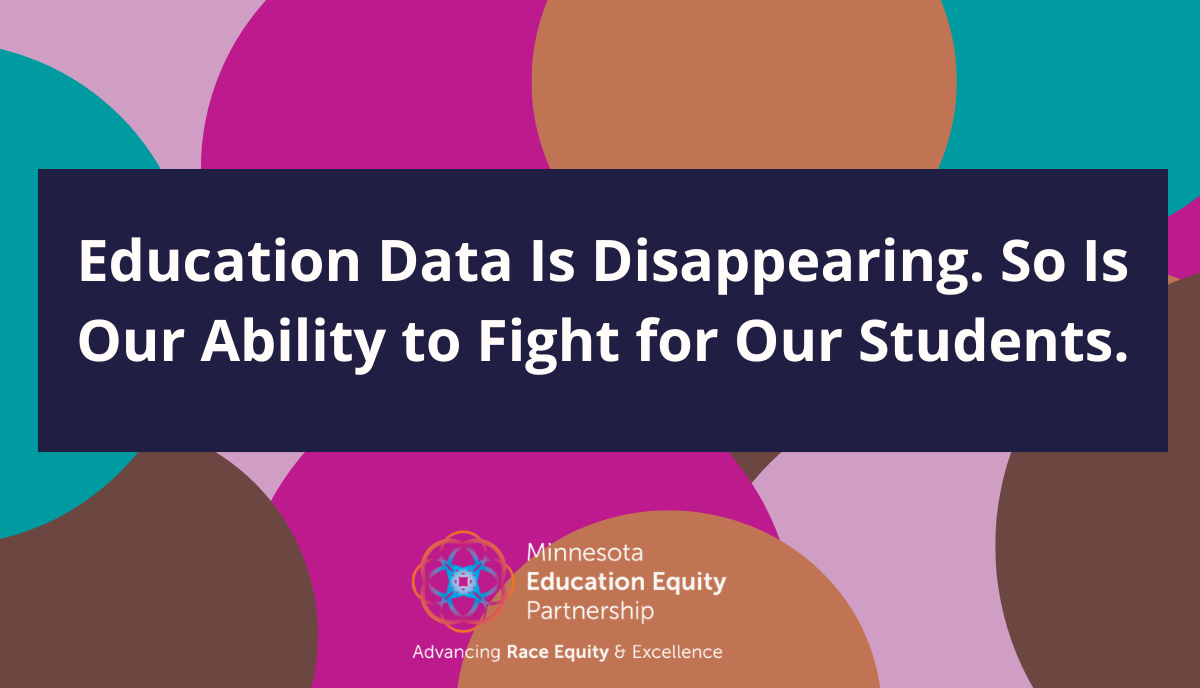
Education Data Is Disappearing. So Is Our Ability to Fight for Our Students.
By Janett Casillas
Director for Research & Emerging Multilingual Learners (EML) Network
Across the country, students are at risk — not just from current unjust policies, but from the quiet collapse of the research and data infrastructure we depend on to see and fix inequities.
In April, our team at MnEEP attended a webinar hosted by the Joyce Foundation and InnovateEDU to discuss the dismantling of research that has long supported critical education equity efforts.
The U.S. Department of Education plans to cancel contracts with the Institute of Education Sciences (IES) and lay off employees responsible for maintaining essential national education data systems, including NAEP, IPEDS, EDFacts, the Common Core of Data, and SLDS support.
These systems provide crucial insights into how students are faring across our public education system.
At the same time, the administration is ending funding grants to higher education institutions conducting critical K-12 research. Together, these actions will severely weaken the ability of researchers, activists, policymakers, and educators to improve schools, and will make it even harder to advance equitable outcomes for students, especially students of color and Indigenous students.
Here’s a breakdown of the critical data collections and evaluations that have been canceled:
Chart from InnovateEDU
The Cost to Students: What’s Lost Without Strong Education Data
Without reliable, centralized, and secure education data, the consequences for students — especially students of color, Indigenous students, and those from low-income backgrounds — are severe.
Data isn’t just about metrics. It’s about visibility, justice, and the ability to act. When data disappears, so does our ability to identify need, allocate resources, and measure progress. Without it, the systems meant to support students will fail the very students they are supposed to serve.
Here’s what’s at stake when strong education data systems break down:
Inequities go unseen — and unaddressed.
Without comprehensive datasets like NAEP and the Common Core of Data, we lose the ability to clearly track how students are faring across different states and systems. Data loss risks masking disparities and obstructing targeted interventions — allowing inequities to deepen, unchallenged.
Smart, equity-centered policies become harder to create.
Policies designed to close opportunity gaps rely on solid data. Without rigorous, representative research, it becomes harder to design, justify, or improve interventions. Disrupting long-term studies also makes it harder to measure progress or to hold anyone accountable for falling short.
Students who need help the most may not receive it.
Timely data shows us which students are struggling and where resources are most urgently needed. Without that information, supports like tutoring, mental health services, and academic interventions may never reach the students who need them most.
Students miss out on what’s working.
When education data systems are fragmented or incomplete, it becomes harder to identify where progress is happening and why. That means successful strategies aren’t shared or scaled, and students in other communities lose access to the benefits of proven, equity-focused solutions.
Research stops reflecting the students equity efforts are meant to serve.
If data collection leaves out schools serving students of color or other historically marginalized communities, research becomes skewed and incomplete. That means the strategies built on that research may fail to meet the needs of the very students equity efforts are supposed to serve.
Families and communities lose power to hold systems accountable.
Transparency measures like school report cards and civil rights monitoring depend on robust, current data. Without them, systemic disparities can persist unchecked, hidden from public view and pressure for reform.
Building Better Schools Depends on Good Data
At MnEEP, we believe education data is not an end in itself — it’s a means to achieve racial equity and justice in education. Data is how we make inequities visible. It’s how we identify which students are being underserved, how we design more racially equitable policies, and how we hold systems accountable for delivering better student outcomes.
When data disappears, the stories and struggles of students are erased. Disparities in learning, access, and outcomes persist unchecked. Resources fail to reach the students who need them most. And the promise of an equitable education remains out of reach.
Data is foundational for building a racially just education where every student can succeed, though we know data alone isn’t enough. It must be community-rooted, collected ethically, disaggregated meaningfully, and used to center the voices and experiences of POCI communities in transforming school systems that truly support all learners.
What Minnesota Must Do Now
If the future of education data is now a state and local responsibility, we must act with urgency.
At MnEEP, we are committed to:
- Advocating for strong local and state data laws, funding, and policies.
- Building capacity for local research efforts that are rooted in community needs.
- Recruiting and supporting researchers of color to lead this vital work.
Data is foundational to creating opportunity for POCI students and building a school system that serves every child with excellence and equity. Without it, we are flying blind.
The work to preserve and strengthen education data is not optional — it is a fight for the future our students deserve. And we are ready to lead.
